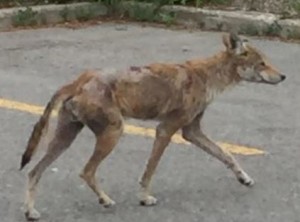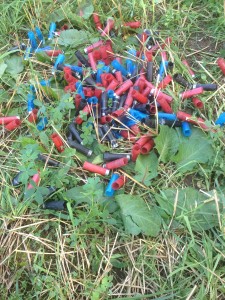This week, police officers in the City of Toronto shot a sick coyote. There was a hue and cry about it from many areas and these vociferous arguments appealed to the basest instincts in the animal versus humanity dichotomy: anthropomorphism, concepts of value relative to human versus animal life, and some abstract concept of kinship with wildlife.

Most of it was bunk.
You see, per the media narrative, this coyote was a ‘single father’ raising three pups after his companion female coyote met her demise under the wheels of a car. This coyote’s death put the orphaned pups in danger (presumably more danger than they already were in as simply being urban coyotes), and the Toronto Wildlife Centre came to the fore in their objections to this course of action, making arguments that stray domestic animals were more harmful than this solitary coyote, that a coyote had only once been documented to ‘nip’ a person in Toronto, and that they themselves could have undertaken the humane treatment and rehabilitation of this heroic animal (although there was no indication, at least in the media, that they had actually attempted said treatment program, even though they admitted that they had been to the den of this coyote).
The theme is all too common. The abstract and presumed well-being of wildlife being secondary to some ‘what-if’ scenario involving injury, inconvenience, or danger to a human population. The coyote just wants to ‘live’ while humanity is the intruder in the animal’s domain. Who is the real animal in this equation?
Et cetera, et cetera.
To put a finer point on this, let’s just do a thought experiment. Imagine if you will, a member of the Toronto Wildlife Centre, or any other member of the public for that matter, attending the pup-laden den of said coyote w3ith nothing but good, helpful intentions. Then the father coyote shows up. Would there be hand-wringing and debate on the part of the coyote about the appropriate course of action, or debates about the merits of the intentions of the human, or would there be a reaction to defend the den and his offspring? I can say with at least some degree of certainty (having been in reasonably close quarters with coyotes) that they can be vicious and dangerous when faced with survival situations, and while they are supremely adapted and bafflingly clever, they are still wildlife with instincts prone to defense of territory, defense of offspring, and defense of food. It is presumable that the intruder in the den might face a sobering situation, and concepts of humane treatment or the abstract details of the human’s life likely would not enter the coyote’s frame of reference.
Who’s being anthropomorphic now?
Of course, that we can have debates about humane practice at all truly crystallizes the fundamental difference between the animal and human experience. Observations of coyotes has shown me that they can do some basic planning, they can do some basic problem solving, and their will to live and ability to adapt is second to very few other native animals in Ontario. But they are not rational, they are not erudite, they do not do math, and they are single-minded in one thing: survival.
And on the topic of survival, it is very likely plausible that an animal in such wretched shape could only have survived that long in an urban environment with access to human-generated food sources; severe mange of the kind seen on the coyote in question is a near-certain death sentence to truly wild coyote. Again, the coyote apologists would use the stock answer of that being at least a ‘natural death’ with seemingly little concern for the suffering endured by the animal. Also, and I’ve always stated this with conviction, a slow, potentially agonizing death, is still a death. That it is caused ‘naturally’ by the chill of a vicious January night on a mangy coyote’s body or ‘unnaturally’ by the bullet from an urban police officer really has little bearing on the final outcome.
So here I am, walking that dangerous and controversial line between the rationalist viewpoint that in terms of safety and what could nebulously be termed ‘the greater good’ having a mange-riddled coyote that is attempting to support pups wandering and hunting through urban and suburban Scarborough is probably a bad idea. At the end of the day I can understand, if not outwardly support the actions of the officers in this scenario. A more impulsively misanthropic sentiment in me does somewhat lament that the situation has come to this, and I can certainly sympathize with the predicament the coyote (and less outwardly relatable wildlife like skunks, raccoons, squirrels, and possums) found itself in. As someone raised with a lifelong conservation ethic, I never want to see the waste of wildlife.
But this is also time to consider the behaviour of people, and what the hue and cry (not to mention the legal and social ramifications) that would appear if said coyote had injured a person, or done worse than injure a person. Would an angry populace be so ‘humane’ had it been a more violent scenario, such as the one from Cape Breton in 2009?
Of course there are stock responses for that argument as well from apologists. That was an isolated incident. That was the fault of people for not giving wildlife respect/a wide berth. That was a rogue animal. People (whatever that means) deserve aggression or should expect animals to ‘fight back’…as though animals know there is even a fight happening, as opposed to just acting on instinctual behaviours.
Et cetera, et cetera.
Of course the fundamental issue with these arguments is that, like it or not, at the most base and primal level, human life is more valuable than animal life. It is a fairly recent, and probably impermanent paradigm, and most certainly not to be taken on a case by case basis (because there are several thousand people that I find less enjoyable than I find a wild turkey or a white-tailed deer) but on the overall balance. We often hear that when it comes to drug use, car accidents, preventable diseases, and the like that ‘one person’s death is one too many’, and without a hint of apology I stand by this ethic when it comes to wildlife encounters at large. Essentially I adhere to the following principal: If an animal can kill you back, and you are not being reckless or unnecessarily provoking to the animal, then I’m okay with people taking reasonable steps to end the animal before it has the opportunity to end you. This is not radical thinking. It is pragmatic and realistic. I personally am not some callous, gun-toting hillbilly that shoots every animal he sees on sight, but even if I were, that would not be germane to the greater argument surrounding this specific scenario in Scarborough, because the argument is about whether the coyote should live at the potential future risk to the people in that area at large.
I have seen many coyotes from afar that were simply doing ‘coyote things’ like hunting, travelling between territories, and generally doing a good job surviving. I had no desire to shoot those specimens. If I saw one in my backyard, acting erratically, sniffing around my door, or looking either sick and/or aggressive, then that’s a different set of circumstances and I would want to be granted (as I would grant any individual or agent of the state, like say, police officers) the liberty to handle the situation in a proactive manner.
Because it is not just hunters, conservationists, and animal rights activists that get a say here. It is people at large and how they view interaction with all levels of wildlife that are required to make their own ethical decisions; decisions which often compromise some level of their personal ethical integrity.
Because even though the situation in Scarborough ended with the black and white choices of life or death for that coyote, the grey areas in urban wildlife management policy, the inevitable reliance on the almighty dollar, humanity’s occasionally misrepresented beliefs about animal behaviour, and our modern view of human-wildlife interactions informed the preamble to that final, some might say inevitable, outcome.

